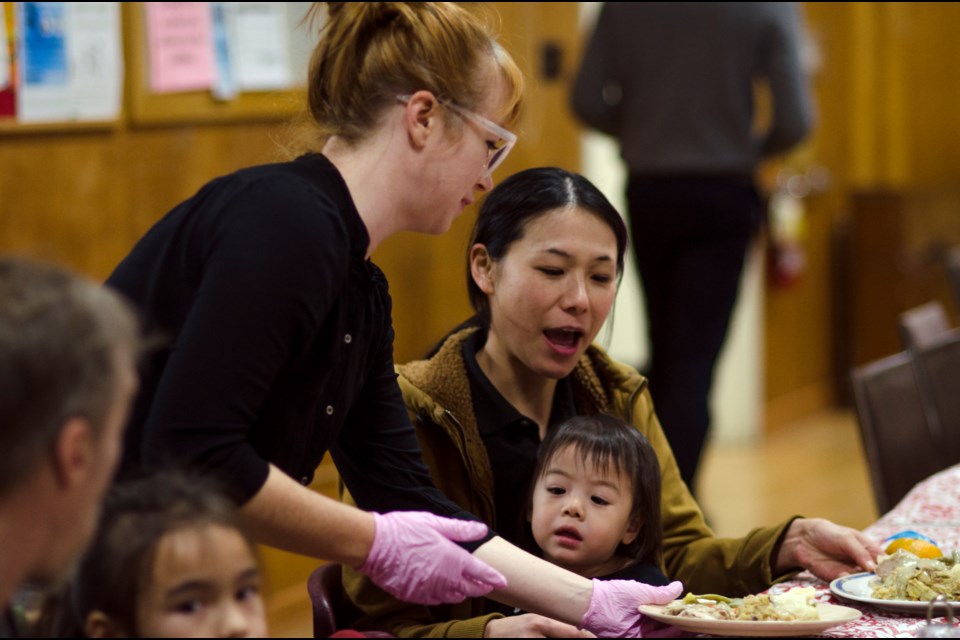Burnaby NOW reporter Jennifer Moreau spent an evening serving Christmas dinner to families in need as part of an exploration on why it feels good to give.
I drove across town after work for the annual Rotary Christmas dinner in a foul mood. It was nothing serious - just too much holiday shopping to do and too many stories to write. I couldn't wait for Christmas to be over.
But I had written enough do-gooder stories encouraging people to help local causes, so I figured it was time to put my money where my mouth was and volunteer at the Christmas dinner.
Upon arrival at the West Burnaby United Church, I was given pink gloves and immediately put to work serving plates of food to families that were filing in the door, kids in tow.
Things were hectic. Volunteers in blue Rotary smocks rushed about, seating parents and kids, while I lined up at the kitchen window to shout dinner orders at the volunteers. There was turkey, mashed potatoes, stuffing and steamed carrots and beans, all smothered in gravy. There were mandarin oranges, cake for dessert and bowls of buns on the tables among sprigs of holiday greenery.
The families heard about the dinner through Burnaby Family Life, the Burnaby Neighbourhood House, Maywood Community School and BASES, a local thrift shop. Any family that could benefit from a good Christmas dinner was invited. There was a wide cross-section of cultures at the table. Some of the children were dressed in frilly gowns, with bows and flowers in their hair. Tonight was clearly special.
The Burnaby Rotary Club organized the annual dinner. St. Michael's Centre, a local hospice run by Providence Health Care, supplied the food, and volunteers set up the tables, served the meals and cleaned up afterwards. In all, approximately 120 people were served.
I quickly moved to bussing, clearing tables and offering cake for dessert. I was introduced to a tall, bespectacled man named Michael Boyd, the Burnaby ophthalmologist who wrote the cheque that covered the meal. For him, having a direct connection to the people he's helping makes it more worthwhile.
"There's other ways I may give support, but it's not as gratifying as coming here. You see people, obviously immigrants, and people who are really suffering. Obviously the kids, they light up," Boyd said. "I grew up in a large family and I remember what Christmas was like for me. You come here and you kind of get an inkling of what it was like when you were a kid before. ... Obviously, the older you get it's all about the giving, it's not how many presents, it's really a time of giving, that's what it's all about really."
Our conversation was cut short by Santa's arrival and overwhelming applause from the under-13 crowd. Kids were called by age groups to line up for a visit with Santa and a gift. The excitement was palpable. Older ones waited for their turn and asked me if their age groups had been called. The toys included Transformers, Barbies, Littlest Pet Shop, Mega Blocks - cool things kids would actually like.
Rotary member Pamela Gardner has organized these dinners for 15 years. Her Christmas wouldn't be complete without the kids.
"I don't know who gets more out of it, them or me. When somebody is given so much and having the opportunity of health and a business, that it's nice to be able to give back, and it's nice to be able to see, not just writing a cheque, but the opportunity to come and help these people and see the smiles on the kids' face. To me, that makes my Christmas," she says. "The easy part in life is writing a cheque. It's finding a cause you believe in and want to help giving money if you can and then giving the time and coming to see what small amount you've been able to contribute to society."
Those warm fuzzy feelings Garnder and Boyd get were impossible to resist.
Helping drew me out that murky malaise. It felt like I was doing something intentional and with purpose, something that broke up the quotidian routine. It was purely enjoyable, and the kids' excitement was priceless. Helping families, some of which are very likely refugees, also put my petty problems in perspective. I felt cheerier, more energized and social. It felt good to help. You want others to be happy, and when they are, you feel better for it.



